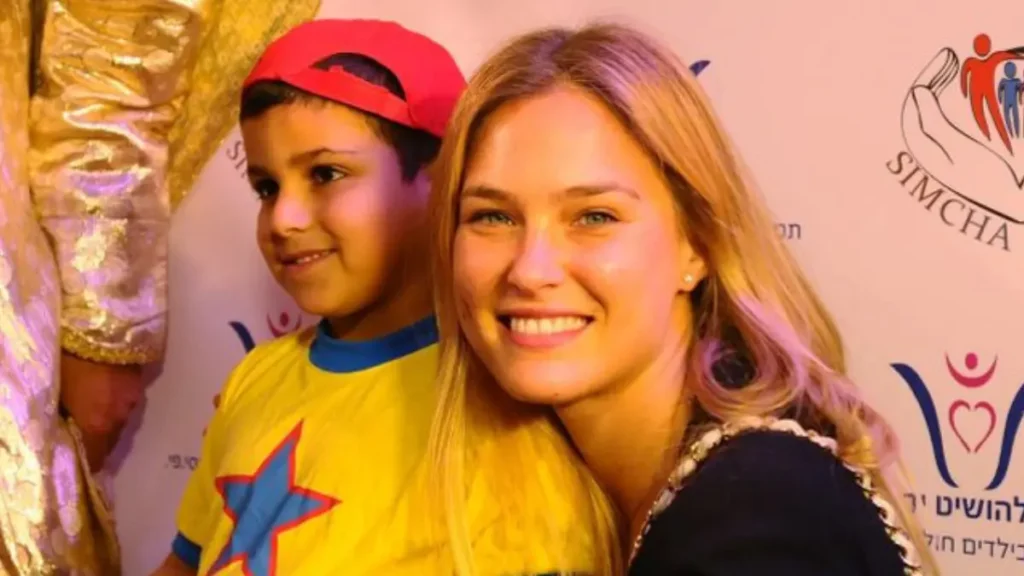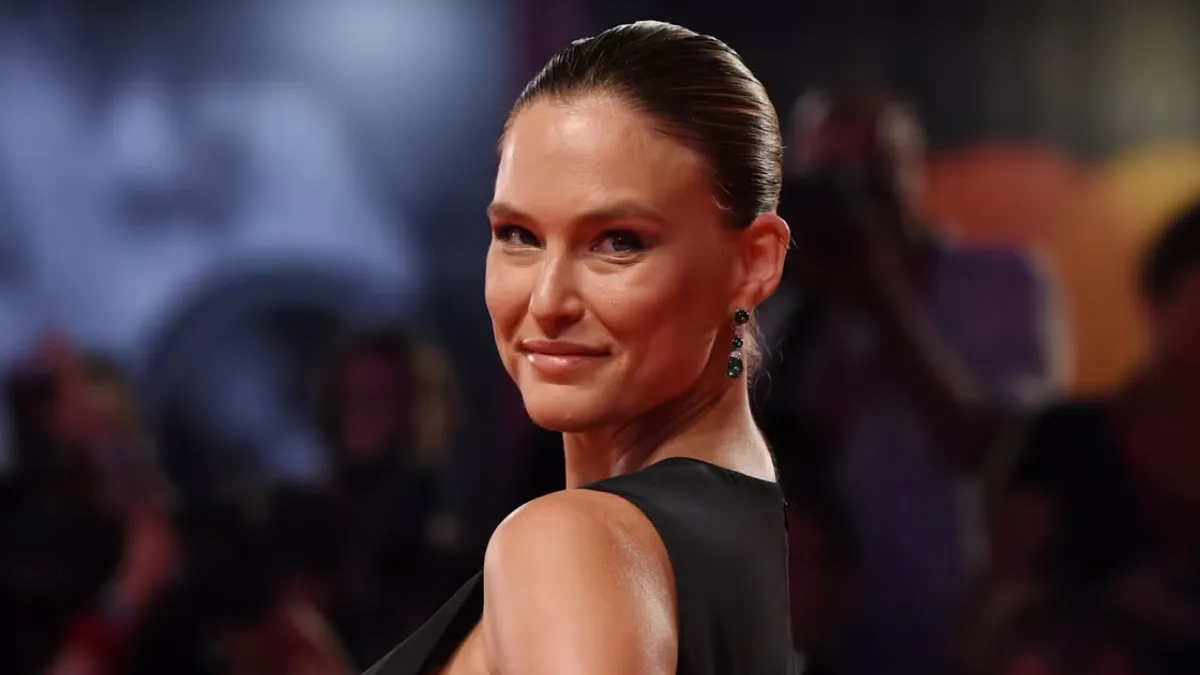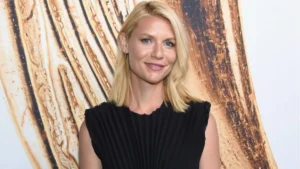Bar Refaeli’s face was everywhere. On the glossy covers of Sports Illustrated in 2009, smiling like the perfect export from Israel to the world. But flip a few pages in any newspaper back home, and the tone changes.
Headlines called her “unpatriotic” (Haaretz, 2003). Years later, others would read “tax evasion trial” in bold across Forbes and the BBC.
The paradox stuck: celebrated supermodel abroad, lightning rod at home.
Fans loved her international rise — rookie of the year in 2007, front row at fashion weeks, brand deals that screamed global. Critics, though, circled every misstep.
The army draft she skipped. The millions she owed in taxes. The gossip pages kept count. The awards. The headlines. The gossip.
Still, isn’t that the story of modern celebrity? Stardom is entangled with scandal until you can’t separate the two. She wasn’t just a model anymore — she became a cultural debate, a national mirror of pride and anger.
Bar Refaeli is both celebrated for her modeling career (Sports Illustrated cover star, 2009) and controversial for avoiding Israel’s military draft and facing a high-profile tax evasion case.
The Military Service Debate That Sparked National Outrage
How Bar Refaeli Avoided Israel’s Mandatory Draft
In Israel, military service isn’t just a policy. Its identity — a shared rite of passage. Which is why the news in 2003 hit like a slap: Bar Refaeli had found a way out.
The workaround? A quick marriage, then a divorce, neatly sidestepping the Israel Defense Forces draft. Legal, yes. Popular? Not even close. Haaretz and the Jerusalem Post ran biting critiques, framing her as a symbol of privilege rather than patriotism.
Fans split sharply. Some launched petitions, angry that one of the country’s brightest stars ducked the same duty their siblings were serving. Others shrugged — wasn’t she already doing her part by putting Israel on the cover of Elle and Sports Illustrated?
But here’s the twist: in a country where the army defines adulthood, dodging service wasn’t just personal. It was a cultural rebellion that followed her for years.
Bar Refaeli avoided Israel’s mandatory army draft by briefly marrying in 2003, a legal loophole that exempted her from service — a move that drew heavy media backlash and public criticism.
Media Backlash and Brand Fallout
The headlines were merciless. Israeli tabloids stamped her as “unpatriotic,” and mainstream outlets like Haaretz questioned whether skipping national duty disqualified her as a cultural ambassador. It wasn’t just newsprint ink — it was a national conversation.
Critics didn’t hold back. Commentators argued she benefited from Israel’s global spotlight but refused to shoulder the same cultural expectation carried by her peers. On early forums — think pre-Instagram comment threads — fans clashed.
Some wrote she had “betrayed the uniform.” Others defended her, pointing to her role in putting Israeli fashion on the world stage.
Brands noticed. An international beauty label reportedly paused negotiations, wary of associating with a star under fire at home. Reputation wasn’t just about catwalks anymore — it was about aligning with values.
And here’s the irony: her image was both bigger than ever and more fragile than it had ever been.
Bar Refaeli faced heavy backlash in Israeli media for avoiding military service, and the controversy caused hesitation among global brands considering endorsements.
Tax Evasion Trials and the Courtroom Spectacle
The Multi-Million Dollar Case Explained
By 2015, the whispers had become court filings. Prosecutors alleged that the star had hidden millions in income by claiming residency abroad — a detail splashed across BBC and Forbes coverage. The case dragged on for years, winding through hearings and headlines until a verdict finally landed in 2020.
The outcome? Costly. She was ordered to pay hefty fines and sentenced to nine months of community service, while her mother received a longer custodial sentence. In court, Refaeli maintained she had followed the advice of financial advisors, but critics saw the defense as thin.
It wasn’t just a legal saga; it was a spectacle. Photographers camped outside the courthouse. Fans debated online — was she being made an example of, or simply facing the same rules as everyone else?
Bar Refaeli was convicted of tax evasion in Israel, fined millions, and sentenced in 2020 to nine months of community service.
Celebrity Justice or Public Humiliation?
The courtroom became a stage. Every arrival, every glance — captured by paparazzi lenses waiting outside the gates. Viral photos spread before verdicts were even read, turning a legal battle into nightly entertainment.
Critics called it a lesson in celebrity justice. A famous name, they argued, softened the blow — community service instead of prison. Others pushed back: wasn’t she, for once, facing the same law as anyone else? Equal before the law, some commentators stressed.
Fans? Split down the middle. On social media, hashtags alternated between outrage at her privilege and sympathy for the humiliation of public spectacle. The trial wasn’t just a legal process — it was media theatre, broadcast in real time.
Modeling Scandals and the Paparazzi Circus
Controversial Campaigns and Brand Partnerships
Fashion campaigns can ignite applause — or firestorms. For Refaeli, some of the boldest shoots blurred that line. Take her Carolina Lemke eyewear ads: neon lights, skin-baring angles, and a tone critics labeled “too provocative for prime time.”
The backlash came fast. Conservative groups in Israel called for boycotts, saying the campaigns clashed with cultural values. Local advertisers debated whether her face sold empowerment or invited scandal. One critic in the Jerusalem Post argued the ads “crossed from edgy into deliberately confrontational.”
Still, the strategy worked globally. Younger fans saw her as fearless, pushing Israeli fashion into international conversations. But at home, those same images sparked culture wars — modern branding versus traditional norms.
Bar Refaeli’s Carolina Lemke ads drew backlash for provocative imagery, fueling boycotts in conservative circles while boosting her global brand visibility.
Tabloids, Paparazzi, and Public Image
Flashbulbs followed her everywhere. At Ben Gurion Airport, outside Tel Aviv restaurants, and even slipping out of LA clubs, the paparazzi swarm was relentless. TMZ and the Daily Mail knew her face guaranteed clicks, while Israeli gossip weeklies plastered her on covers with headlines leaning toward scandal.
Some of those shots told stories that weren’t really there. A night out became a “mystery man” rumor. A smile in Milan turned into whispers of new deals. Critics accused the tabloids of exaggerating; fans fired back with hashtags defending her right to live without constant surveillance.
Still, others joined the mockery — memes, jokes, endless threads dissecting every candid photo. It was entertainment, sure, but also erosion. Each flashbulb chipped away at her public image.
Paparazzi and tabloids often amplified Bar Refaeli’s controversies, turning everyday moments into global gossip headlines.
High-Profile Relationships and Gossip Headlines
The Leonardo DiCaprio Years
From Cannes to courtside at Lakers games, the pairing of Bar Refaeli and Leonardo DiCaprio was everywhere between 2005 and 2011. The media called them a “power couple,” splashing their faces across People covers and glossy spreads in lifestyle magazines.
Fans couldn’t get enough. Social forums buzzed with sightings, while fashion critics noted how her profile skyrocketed in the U.S. — covers, red carpets, and invites to elite circles. It wasn’t just love on display; it was career fuel.
But speculation swirled too. Were they on? Off? Getting serious? Headlines leaned heavily on rumor, often blurring fact and gossip. Worth saying clearly: only their public appearances and confirmed dates are on record. The rest? Media chatter.
Still, the relationship cemented her as more than an Israeli export. For a moment, she was part of Hollywood’s inner ring.
Yes, Bar Refaeli dated Leonardo DiCaprio from 2005 to 2011, a high-profile relationship that boosted her global media visibility.
From Public Romance to Private Scrutiny
When the high-profile romance faded, the spotlight didn’t. If anything, it burned brighter — but harsher. Every outing, every “mystery friend,” became tabloid fodder. The gossip press circled like hawks, eager to frame her next chapter as a scandal rather than simply moving on.
On fan forums, the chatter turned relentless. Some defended her, saying she deserved privacy after years of public obsession. Others speculated endlessly — who she was dating, why she was spotted alone, what the smile in one photo really meant. A single candid could fuel weeks of online debates.
But here’s where it cuts deeper: the conversation stopped being about modeling. Instead, it was about control. Could a celebrity ever reclaim her narrative once the press decided her private life was public property?
When Fashion Meets Politics and Culture Wars
The Eurovision 2019 Hosting Debate
When Tel Aviv hosted Eurovision in 2019, the country framed it as a cultural victory — glitter, music, global eyes on Israel. And then came the announcement: Bar Refaeli would co-host. Cue the uproar.
Critics questioned her suitability almost immediately. Media reports pointed to her tax evasion case, asking if a figure tied to courtroom headlines should represent Israel on one of Europe’s biggest stages. Cultural analysts noted the tension: Eurovision wasn’t just entertainment, it was politics dressed in sequins.
But fans weren’t all against it. Hashtags like #BarHostsEurovision trended, with younger audiences celebrating the choice as bold and modern. Others posted memes mocking the irony — a star once branded “unpatriotic” now fronting a national showcase.
The moment captured Israel’s split personality: global glam against domestic criticism, pride colliding with controversy.
Bar Refaeli’s role as a Eurovision 2019 host sparked debate, with critics citing her scandals while fans defended her as a modern face of Israel.
The Celebrity-Activism Dilemma
In an era where stars tweet statements before PR teams even draft them, her silence stood out. No hashtags. No fiery op-eds. Just fashion launches and Instagram posts of family life.
Critics pounced. Cultural commentators framed it as avoidance, saying, “In today’s climate, stars must take a stand.” Activists in fan communities echoed the same frustration, pointing to peers who used their platforms to spotlight human rights or environmental issues.
Fans, though, were split. Some argued she wasn’t obligated — that not every model must morph into a political voice. Others saw her silence as a privilege, especially in a country where politics isn’t just policy, it’s daily survival.
So, where did she land? Squarely in the middle: entrepreneurship and brand-building over activism, a choice that pleased fashion houses but left a cultural question mark hanging.
Lessons From a Career Built on Scandals
Comparing Bar Refaeli’s Controversies With Peers
Scandal doesn’t hit every star the same way. Some fall, some reinvent, and a few even spin controversy into power.
Take Kate Moss. In 2005, she faced a career-threatening drug scandal — yet within two years she was fronting Dior and Burberry again. Gisele Bündchen? Her narrative bent the other way. Instead of scandal, she tied her legacy to eco-activism, balancing supermodel status with environmental campaigns. And then there’s Naomi Campbell, whose temper made headlines but somehow only deepened her fashion icon mystique.
For Refaeli, the mix was different: army draft avoidance, tax evasion, endless tabloid cycles. Unlike Moss or Campbell, her controversies are tied directly to national identity and legal systems — heavier, harder to reframe.
| Celebrity | Controversy / Image Issue | Outcome / Reinvention |
| Bar Refaeli | Army draft, tax evasion | Ongoing media scrutiny, brand rebuild |
| Kate Moss | Drug scandal (2005) | Career comeback, high-fashion return |
| Gisele Bündchen | Criticized but eco-activist | Reputation strengthened through activism |
| Naomi Campbell | Temper, assault allegations | Iconic runway presence sustained |
Reinvention and Reputation Management
After years of headlines dominated by scandal, the narrative began to shift. Slowly, deliberately. The supermodel recast herself not just as a fashion figure but as a mother of three, posting softer glimpses of family life on Instagram. The tabloids that once chased tax trial photos now ran spreads of strollers and baby showers.
It wasn’t accidental. Branding experts pointed out how motherhood softened her image, aligning with audiences who valued “relatable” celebrity arcs. At the same time, she doubled down on business ventures — eyewear lines, fashion collaborations — choosing entrepreneurship as her steady platform.

Philanthropy mentions surfaced, too, with her name tied to charity galas and cultural projects. Critics noted that while these gestures didn’t erase past controversies, they reframed her in the public eye as someone rebuilding, balancing accountability with progress.
And maybe that was the point. Not to erase, but to reinvent.
Bar Refaeli rebuilt her image post-scandals through motherhood narratives, philanthropy appearances, and fashion business ventures, reshaping her reputation from controversy to reinvention.
Cultural Legacy of Bar Refaeli’s Controversies
Zoom out for a second. This isn’t just about one supermodel’s mistakes — it’s about how a celebrity becomes a cultural fault line. In Israel, Bar Refaeli wasn’t only judged as a cover girl or entrepreneur. She was held up as a mirror, reflecting what the country expected from its icons and what it refused to forgive.
Her controversies — the draft avoidance, the tax trial, the endless paparazzi reels — didn’t just shape her image. They reshaped the rules of celebrity in Israel. Suddenly, brand managers asked harder questions before signing deals: could a scandal blow up in their faces? Would fans boycott? That caution trickled down to younger models, who learned quickly that being photogenic wasn’t enough — you had to be squeaky-clean, too.
Fans left their own imprint. Memes mocking her courtroom looks trended, but so did hashtags celebrating her resilience as a working mother. Online, she existed in two worlds: admired abroad for runway glitz, scrutinized at home as a cautionary tale.
Critics often call it a “dual legacy.” On one hand, she proved Israeli models could dominate global fashion. On the other hand, she carried scandals that continue to define her pop-culture footprint. Both truths live side by side.
Bar Refaeli’s controversies left a lasting cultural imprint in Israel, reshaping brand behavior, fan culture, and the expectations placed on younger models.
Beyond Scandal, Toward Reinvention
Scandals defined her. But they didn’t end her. That’s the paradox of Bar Refaeli — a woman both celebrated and scrutinized, adored and condemned.
Her career proves resilience has layers. Magazine covers still surface. Business ventures still launch. And motherhood, almost quietly, reframed her as more than a headline magnet. Love her or hate her, she’s unforgettable, one critic wrote, capturing the split that has followed her for decades.
In Israel, she remains a lightning rod. Abroad, a fashion export who carved space in an industry rarely forgiving. And maybe that’s the legacy: not spotless perfection, but survival through storms.
What happens next? Perhaps new projects, maybe more reinvention. For now, her story isn’t finished. Just paused, waiting for the next chapter to write itself.
FAQs About Bar Refaeli Controversies
Why didn’t Bar Refaeli serve in the Israeli army?
What was Bar Refaeli convicted of in Israel?
How did Bar Refaeli’s controversies affect her modeling career?
Did Bar Refaeli lose endorsements because of scandals?
Is Bar Refaeli still active in modeling after scandals?
Nishant Wagh is the founder of The Graval and a seasoned digital journalist with over 15 years of experience covering entertainment, media, and culture. He specializes in breaking news and trending stories told with accuracy, context, and depth.





6 thoughts on “Bar Refaeli’s Controversies: From Tax Evasion to Modeling Scandals”